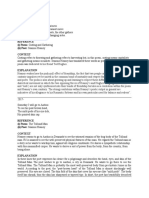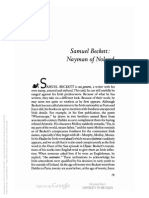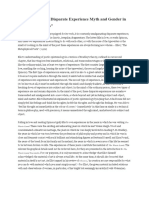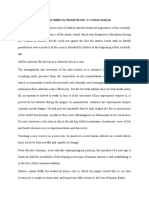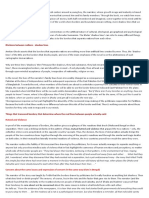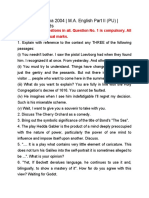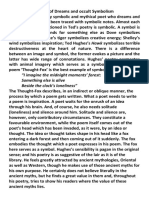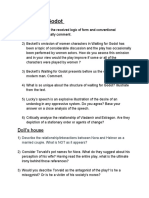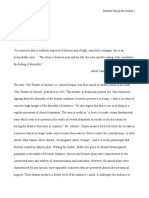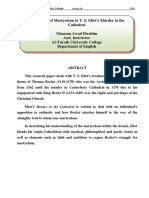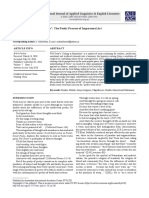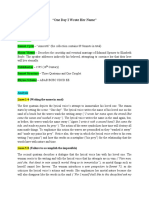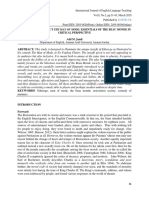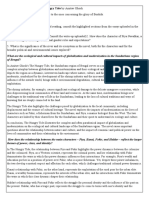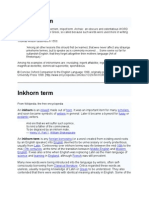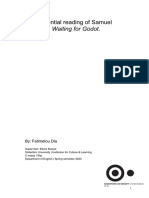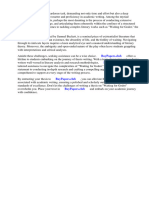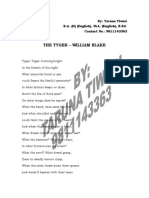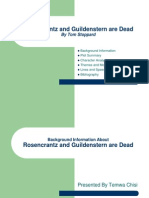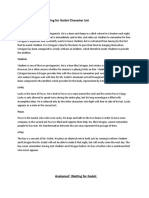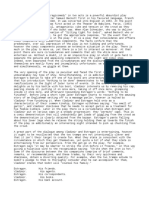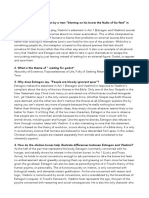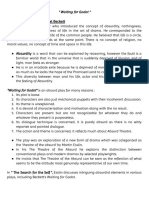Professional Documents
Culture Documents
Language in Waiting For Godot
Language in Waiting For Godot
Uploaded by
Noman Shahzad0 ratings0% found this document useful (0 votes)
440 views3 pagesSamuel Beckett uses language in Waiting for Godot to show the meaninglessness of human existence and the failure of language as a tool for communication. His characters struggle to find meaning through difficult, contradictory dialogues filled with nonsense words and repetition. Language breaks down on both individual and social levels as characters experience speech impediments, aphasia, and inability to understand each other. Beckett aims to devalue language and show its inadequacy for conveying conceptual thought or discovering truth about the human condition through this deliberate disintegration of communication in the play.
Original Description:
Original Title
Language_in_Waiting_for_Godot.doc
Copyright
© © All Rights Reserved
Available Formats
DOC, PDF, TXT or read online from Scribd
Share this document
Did you find this document useful?
Is this content inappropriate?
Report this DocumentSamuel Beckett uses language in Waiting for Godot to show the meaninglessness of human existence and the failure of language as a tool for communication. His characters struggle to find meaning through difficult, contradictory dialogues filled with nonsense words and repetition. Language breaks down on both individual and social levels as characters experience speech impediments, aphasia, and inability to understand each other. Beckett aims to devalue language and show its inadequacy for conveying conceptual thought or discovering truth about the human condition through this deliberate disintegration of communication in the play.
Copyright:
© All Rights Reserved
Available Formats
Download as DOC, PDF, TXT or read online from Scribd
Download as doc, pdf, or txt
0 ratings0% found this document useful (0 votes)
440 views3 pagesLanguage in Waiting For Godot
Language in Waiting For Godot
Uploaded by
Noman ShahzadSamuel Beckett uses language in Waiting for Godot to show the meaninglessness of human existence and the failure of language as a tool for communication. His characters struggle to find meaning through difficult, contradictory dialogues filled with nonsense words and repetition. Language breaks down on both individual and social levels as characters experience speech impediments, aphasia, and inability to understand each other. Beckett aims to devalue language and show its inadequacy for conveying conceptual thought or discovering truth about the human condition through this deliberate disintegration of communication in the play.
Copyright:
© All Rights Reserved
Available Formats
Download as DOC, PDF, TXT or read online from Scribd
Download as doc, pdf, or txt
You are on page 1of 3
Language in Waiting for Godot
Samuel Beckett has chosen to write in a language that always
points out that the world is absurd and chaotic, that man is alone and in
despair. He demonstrates that language is the fundamental means of
deception. But his language is used as a system devoid of content which
moves only with itself.
Becketts language is a mixture of elements rarely found together in the
same narrative. It is murky, baffling, circular,
contradictory, full of offensive details, furious violence and
sardonic, terrifying insights into the meaninglessness of human life.
His language is difficult to interpret for its general verbosity
by the difficulty of the words and phrases. It is serious because it, mainly,
deals with complex and oddly tragic characters who cannot reconcile the
unreality of the seen world with the reality of the unseen.
Language is reduced by Beckett making it nothing more than a
deserted castle whose gaping cracks let in the wind and rain. He, however,
uses it just like the body and the mind of his characters, considers it as a
faulty and inadequate tool. Speech, another mark of mans finitude, breaks
down within the individual. Moreover, it sometimes leads to deterioration
and often to total failure of communication with others
Since Beckett uses language to show the function of language in human
existence, the speech patterns of the characters: recurrent vocabulary,
pronoun shifts, sound effects, etc., re-enforce the major themes and the
mixed tone of the play. In other words, the comic effects of language used by
characters grimly underline the themes of tedium and absurdity that
dominate the plays.
In Waiting for Godot, Vladimir is the character who gropes for meaning,
but the meaning does not appear. His attempts are reduced to incoherence
and, finally, silence by his partner, Estragon.
The dialogue, between the characters, is studded with words that have no
meaning for normal ears. They (words) reconcile
themselves with reason that makes the dialogue often baffling.
Beckett makes it difficult to demonstrate which comes first,
memory deterioration or language disintegration, one clearly
accompanies the other. Thus, in Luckys case a traumatized
memory is combined with partial aphasia and ultimately total
silence.
This situation manifests itself in stuttering (acacacacademie; anthropopom
etric; qua-quaquaqua). In stammering (etabli tabli tabli, ce qui suit qui... etc
In addition to the aphasia and stuttering there is some evidence
of a certain amount of speech disintegration that are ellipsis and stammering
which are observable in Pozzos speech from the stress of Vladimirs
criticism:
I cant bear it...any longer...the way he goes on...youve no
idea...its terrible...he must go...(he waves his arm)...Im going
mad (He collapses his head in
his hands)...I cant bear it...any
longer
Hesitancy in speech is observable in both Estragon and Vladimir in the
former this fumbling for words appears to emanate from embarrassment:
Thats to say...you understand...the dusk...the strain...waiting...I confess...
I imagined...for a second
Language disintegration such as these on the individual level is the sign of
the general inadequacy of speech to cope with a variety of situations and of
the in coordination between speech and memory or thought.
One of the major causes of misunderstanding among the characters proceeds
from faulty communication due to types of imprecision such as ambiguity,
misconstruing a question, confusion of sounds, etc.
Waiting for Godot opens on an ambiguous note, Nothing to be done, that
does not lead into a dialogue but into
Beckett, in his use of language, reveals the fallibility of
language as a medium for the discovery and communication of metaphysical
truth. He ensures that his writing remains a constant struggle, a painful
wrestling with the spirit of language itself. The themes of Waiting for Godot
and other plays persist the difficulty of finding meaning in a world subject to
incessant change, his use of language probes the limitations of language both
as a vehicle for the expression of valid statement- an instrument of thoughts
oder
truths
As a result of lack of communication, each man follows his own thoughts,
while the silence and pauses isolate words and phrases and the repetitions
remind us how monotonous, repetitive and tedious life is. The play is fully
replete with repetition; without variety or novelty, and paradoxes
with no resolution. Moreover, apart from mirroring the repetitious circle of
life, So many repetitions in the play well serve the characters to busy
themselves and pass the painful time less consciously. So Beckett uses
language not as a divine instrument but as mere senseless buzzing.
It is used in a world that has lost its meaning, language also
becomes a meaningless buzzing .
Language is used like difficult music heard for the first time as Niklaus
Gessner in his The Inadequacy of Language, has tabulated ten different
modes of disintegration of language
; they range from simple misunderstanding and double-entende rs to
monologues (as signs of inability to communicate), clichs, repetitions of
synonyms, inability to find the right words, and telegraphic style (loss of
grammatical structure, communication by shouted commands) to the farrago
(medley, hotch-potch, indiscriminate mixture of
Becketts use of language is designed to devalue language as a
vehicle of conceptual thought of ready-made answers to the
problem of the human condition.
The dialogue is studded with words that have no meaning for
normal ears; repeatedly it announces that it has come to a stop, and will have
to start again; never does it reconcile itself with reason.
Speech is the basis of existence. But it, like the body and the
mind, is used as a faulty and inadequate tool. Speech, although it is another
mark of mans finitude, breaks down within the individual moreover, it
sometimes leads to deterioration and often to total failure of communication
with others.
Disintegration of language is achieved through various methods in Absurd
drama: The use of meaningless words uttered mechanically with no logical
links or grammatical structure occurs in absurdists plays. These dramatis
ts make little use of language as a means of influence. Language which
seeks to present a meaning, characterization is hardly achieved.
Furthermore, the absudists usually show their disbelief in language as an
instrument of communication in the employment of purely theatrical effects.
Beckett occupied with the failure of language to communicate
the menaces of life and its meaninglessness. Consequently he uses language
as an atmosphere of entrapment. His endless, futile speech is the history of
the human spirit. He replaces customary plot, structure and language with
fragmentary, contradictory and often nonsensical dialogue in order to
present a world of chaos that mocks established institution and conformity.
Beckett used the language of gesture and movements to make
inanimate things play their action, and to relegate dialogue. He
reduced language to a very subordinate role. His language becomes the
adequate representation of stagnant life and meaninglessness it relates to
life without action, de
scribes man deprived of history.
The circular structure of the play together with the paradoxical
symmetries, which pervade the whole play, clearly prove that all the
characters' yesterdays have been the same as today and that tomorrow will
be no different from that. Therefore, the play in which the true meaning and
the best formal representation of the absurd life of modern men are
masterfully depicted.
You might also like
- The Elements of Realism in Henrik Ibsens Play A Dolls HouseDocument2 pagesThe Elements of Realism in Henrik Ibsens Play A Dolls HouseLeni KichaNoch keine Bewertungen
- Reference (I) Poem: Casting and Gathering (Ii) Poet: Seamus Heaney ContextDocument2 pagesReference (I) Poem: Casting and Gathering (Ii) Poet: Seamus Heaney ContextAisha KhanNoch keine Bewertungen
- Othello A TDocument5 pagesOthello A TAR MalikNoch keine Bewertungen
- Beckett X Ellmann Nayman of NolandDocument18 pagesBeckett X Ellmann Nayman of NolandNatalí ValleNoch keine Bewertungen
- The Essence of Language in Samuel Beckett's PDFDocument5 pagesThe Essence of Language in Samuel Beckett's PDFFatiFlureNoch keine Bewertungen
- 1449 Assignment 1 Themes in Waiting For GodotDocument9 pages1449 Assignment 1 Themes in Waiting For GodotMuhammad Umer Farooq BajwaNoch keine Bewertungen
- A Game of ChessDocument19 pagesA Game of ChessJl WinterNoch keine Bewertungen
- A Midsummer Night - Treatment of WomenDocument4 pagesA Midsummer Night - Treatment of WomenSher Elliott100% (1)
- Waiting - For - Godot and Man and SupermanDocument31 pagesWaiting - For - Godot and Man and SupermanShahbaz AhmedNoch keine Bewertungen
- The Life of Galileo by Bertolt Brecht: A Critical AnalysisDocument5 pagesThe Life of Galileo by Bertolt Brecht: A Critical AnalysisRavneet KourNoch keine Bewertungen
- Assignment On Waiting For Godot: 20Th Century English Drama ENG 414Document8 pagesAssignment On Waiting For Godot: 20Th Century English Drama ENG 414Rifa Kader DishaNoch keine Bewertungen
- AN ABSURDIST PLAY EndgameDocument10 pagesAN ABSURDIST PLAY EndgameVaishnavi ChaudhariNoch keine Bewertungen
- Auden As A Poet of NatureDocument4 pagesAuden As A Poet of Naturemanazar hussain100% (1)
- Samuel Beckett PaperDocument10 pagesSamuel Beckett Paperapi-310329662Noch keine Bewertungen
- MA Literary Criticism On PLATO's Argument Against PoetryDocument4 pagesMA Literary Criticism On PLATO's Argument Against PoetryAmihan Comendador Grande100% (1)
- " Thou Hast Made Me, and Shall Thy Work Decay?Document2 pages" Thou Hast Made Me, and Shall Thy Work Decay?Sbgacc SojitraNoch keine Bewertungen
- Existentialism and Samuel Bekett's Waiting For Godot: SHOMIK DE (NET Qualified)Document4 pagesExistentialism and Samuel Bekett's Waiting For Godot: SHOMIK DE (NET Qualified)Adeel SafdarNoch keine Bewertungen
- Waiting For Godot and The Care TakerDocument8 pagesWaiting For Godot and The Care TakeribrahimkhanNoch keine Bewertungen
- The Hollow MenDocument6 pagesThe Hollow MenIkram Tadj100% (1)
- Themes of Waiting For GodotDocument4 pagesThemes of Waiting For Godotkhalid ijazNoch keine Bewertungen
- Divisions Between Nations - Shadow LinesDocument4 pagesDivisions Between Nations - Shadow LinesÜzwâl JrNoch keine Bewertungen
- Assignment 1Document6 pagesAssignment 1Sumaira MalikNoch keine Bewertungen
- Existentialism in Samuel BeckettDocument20 pagesExistentialism in Samuel BeckettFalak FalakNoch keine Bewertungen
- Past Paper of Drama 2004-2019Document22 pagesPast Paper of Drama 2004-2019Noor Ulain0% (1)
- Discuss Hughes' Use of Dreams and Occult SymbolismDocument16 pagesDiscuss Hughes' Use of Dreams and Occult SymbolismJimmi KhanNoch keine Bewertungen
- Composition: A Portrait of The Artist As A Young Man Is A Semi-Autobiographical Novel byDocument3 pagesComposition: A Portrait of The Artist As A Young Man Is A Semi-Autobiographical Novel byEm VardolNoch keine Bewertungen
- Becketts Waiting For Godot TragicomedyDocument2 pagesBecketts Waiting For Godot TragicomedyAurore Zhang100% (1)
- Waiting For Godot DramaDocument4 pagesWaiting For Godot DramaAlishaNoch keine Bewertungen
- Waiting For Godot and Theatre of Absurd Critical AnalysisDocument6 pagesWaiting For Godot and Theatre of Absurd Critical AnalysisROUSHAN SINGH100% (2)
- A Modern TragedyDocument2 pagesA Modern TragedySaleem RazaNoch keine Bewertungen
- PygmalionDocument4 pagesPygmalionAmjad RazaNoch keine Bewertungen
- 1) Evaluation of Waiting For Godot As An Absurdist Play: The Characteristics of Absurdist Drama Plot and StructureDocument17 pages1) Evaluation of Waiting For Godot As An Absurdist Play: The Characteristics of Absurdist Drama Plot and StructureRifa Kader DishaNoch keine Bewertungen
- Critical Appreciation of Second ComingDocument1 pageCritical Appreciation of Second ComingBijay Irammad AlNoch keine Bewertungen
- "Doctor Faustus": Internal or Tragic ConflictDocument3 pages"Doctor Faustus": Internal or Tragic Conflictattiqa100% (1)
- Theme of Murder in CathedralDocument20 pagesTheme of Murder in CathedralSyed Qasim ShahNoch keine Bewertungen
- Question:Significance of Time in Waiting For GodotDocument3 pagesQuestion:Significance of Time in Waiting For GodotAaryan Nayak100% (2)
- Man and Superman Character ListDocument5 pagesMan and Superman Character Listfahmi tamannaNoch keine Bewertungen
- Critical Appreciation and ThemesDocument2 pagesCritical Appreciation and ThemesRifa Kader Disha0% (1)
- Yeatss Sailing To Byzantium The Poetic Process of PDFDocument17 pagesYeatss Sailing To Byzantium The Poetic Process of PDFNijum MiahNoch keine Bewertungen
- Shakespearean Tragedy: The Substance of A Tragedy - From A.C. BradleyDocument13 pagesShakespearean Tragedy: The Substance of A Tragedy - From A.C. BradleySubhash KamalkarNoch keine Bewertungen
- Class Conflict in Hedda Gabler Assignment-1Document2 pagesClass Conflict in Hedda Gabler Assignment-1Arshad MunirNoch keine Bewertungen
- Waiting For Godot by Samuel Beckett Is One of The Most Famous Plays of The TwentiethDocument4 pagesWaiting For Godot by Samuel Beckett Is One of The Most Famous Plays of The TwentiethNamrata SarmaNoch keine Bewertungen
- Modern DramaDocument24 pagesModern DramaNabeel Riasat Riasat AliNoch keine Bewertungen
- Paradise Lost Book 2 SummaryDocument2 pagesParadise Lost Book 2 SummaryKaushik RayNoch keine Bewertungen
- Hamlet's DelayDocument3 pagesHamlet's DelayYasir JaniNoch keine Bewertungen
- SocioDocument24 pagesSocioGovt. Tariq H/S LHR CANT LAHORE CANTTNoch keine Bewertungen
- OneDAY I WROTE HER NAME - ANALYSISDocument2 pagesOneDAY I WROTE HER NAME - ANALYSISMIJANUL HAQUENoch keine Bewertungen
- UntitledDocument2 pagesUntitledATUFA·Noch keine Bewertungen
- The-Man-Of-Mode Features of Restoration ComedyDocument15 pagesThe-Man-Of-Mode Features of Restoration ComedySharmila DasNoch keine Bewertungen
- A Doll's House Justification of TitleDocument2 pagesA Doll's House Justification of TitleShabana SajjadNoch keine Bewertungen
- Question#4 Answer: Psychoanalytic TheoryDocument14 pagesQuestion#4 Answer: Psychoanalytic Theorymuneeba khanNoch keine Bewertungen
- West Wind SymbolismDocument2 pagesWest Wind SymbolismBaloch KarawanNoch keine Bewertungen
- My Last Duchess by Robert Browning Line by Line NotesDocument3 pagesMy Last Duchess by Robert Browning Line by Line Notesapi-298120057Noch keine Bewertungen
- Characters in AmedeeDocument2 pagesCharacters in AmedeeAsim JattNoch keine Bewertungen
- Twentieth Century DramaDocument4 pagesTwentieth Century DramaArchana MehraNoch keine Bewertungen
- Leaves in The Storm: Narrating Trauma of Children in Selected Partition StoriesDocument7 pagesLeaves in The Storm: Narrating Trauma of Children in Selected Partition StoriesIJELS Research JournalNoch keine Bewertungen
- A Look Into Mock Epic Poetry-4468 PDFDocument12 pagesA Look Into Mock Epic Poetry-4468 PDFShalini DasNoch keine Bewertungen
- Important Questions From The Hungry Tide by Amitav GhoshDocument4 pagesImportant Questions From The Hungry Tide by Amitav GhoshAudri DebnathNoch keine Bewertungen
- Inkhorn Term (Definition & Wikipedia Article)Document2 pagesInkhorn Term (Definition & Wikipedia Article)KAWNoch keine Bewertungen
- Asking Clarifying Questions in Open-Domain Information-Seeking ConversationsDocument10 pagesAsking Clarifying Questions in Open-Domain Information-Seeking ConversationsNoman ShahzadNoch keine Bewertungen
- MID TERM FALL 2020-21: Program Name (BS ENG)Document13 pagesMID TERM FALL 2020-21: Program Name (BS ENG)Noman ShahzadNoch keine Bewertungen
- The Study of English Literature: April 2016Document11 pagesThe Study of English Literature: April 2016Noman ShahzadNoch keine Bewertungen
- Cover LetterDocument5 pagesCover LetterNoman ShahzadNoch keine Bewertungen
- Waiting For Godot SummaryDocument6 pagesWaiting For Godot Summarywesal yousef ali faragNoch keine Bewertungen
- Waiting For Godot Essay QuestionsDocument2 pagesWaiting For Godot Essay QuestionsAdel100% (1)
- Themes of "Waiting For Godot" - Thematic ConceptDocument10 pagesThemes of "Waiting For Godot" - Thematic ConceptMuhammad IsmailNoch keine Bewertungen
- An Existential Reading of Samuel Beckett S Waiting For GodotDocument32 pagesAn Existential Reading of Samuel Beckett S Waiting For GodotNenad VujosevicNoch keine Bewertungen
- Research Paper On Waiting For GodotDocument6 pagesResearch Paper On Waiting For Godotgw0q12dxNoch keine Bewertungen
- Symbols of Waiting by Carolyn Joy LenskeDocument3 pagesSymbols of Waiting by Carolyn Joy LenskemarianotavaresNoch keine Bewertungen
- Tragicomedy & Theater of The AbsurdDocument43 pagesTragicomedy & Theater of The AbsurdRafly PNoch keine Bewertungen
- The TygerDocument33 pagesThe TygerSoumya PahujaNoch keine Bewertungen
- StoppardDocument32 pagesStoppardBishnu Pada RoyNoch keine Bewertungen
- Modern Drama. McqsDocument22 pagesModern Drama. McqsLalkhanNoch keine Bewertungen
- ABSURDISM in Waiting For GodotDocument11 pagesABSURDISM in Waiting For GodotJinal Mistry67% (3)
- Waiting For Godot Character List: EstragonDocument9 pagesWaiting For Godot Character List: Estragonabida jamaliNoch keine Bewertungen
- Waiting For Godot As Tragicomedy AssignmentDocument3 pagesWaiting For Godot As Tragicomedy AssignmentSaher Hiba KhanNoch keine Bewertungen
- Beckett and Decay by Kathryn WhiteDocument178 pagesBeckett and Decay by Kathryn Whitedhrm76100% (1)
- McDonald 2Document8 pagesMcDonald 2Aqsa ZoniaNoch keine Bewertungen
- Godot Theatre of The AbsurdDocument3 pagesGodot Theatre of The AbsurdCamellia ChoudhuriNoch keine Bewertungen
- Waiting For Godot and The Care TakerDocument8 pagesWaiting For Godot and The Care TakeribrahimkhanNoch keine Bewertungen
- ملخص مسرحية Waiting for GodotDocument8 pagesملخص مسرحية Waiting for Godotلوةى االاب100% (1)
- Lawson Theory and Technique of Playwriting and Screenwriting - BOOK - PDFDocument382 pagesLawson Theory and Technique of Playwriting and Screenwriting - BOOK - PDFVeljko KovacevicNoch keine Bewertungen
- Waiting For GodotDocument3 pagesWaiting For GodotVellen Nydia.FlorenceNoch keine Bewertungen
- Waiting For Godot NotesDocument4 pagesWaiting For Godot NotesPrachi SharmaNoch keine Bewertungen
- Literature Review of Waiting For GodotDocument5 pagesLiterature Review of Waiting For Godotfvjebmpk100% (1)
- 2019 J B.eng-044 (African Literature)Document4 pages2019 J B.eng-044 (African Literature)summaiya RizwanNoch keine Bewertungen
- Waiting For Godot - Key EventsDocument2 pagesWaiting For Godot - Key Eventsjyc418100% (1)
- Bureu Ramos - Utopia-Samuel BeckettDocument10 pagesBureu Ramos - Utopia-Samuel BeckettgiselleingridNoch keine Bewertungen
- The Waiting in Waiting For GodotDocument4 pagesThe Waiting in Waiting For GodotNada100% (4)
- Reading Questions 3 - Waiting For Godot 2020Document4 pagesReading Questions 3 - Waiting For Godot 2020Rocío Martínez HiguerasNoch keine Bewertungen
- Final 20th Questions 250Document23 pagesFinal 20th Questions 250VyshnupriyaNoch keine Bewertungen
- Section OneDocument14 pagesSection Onecam spiderNoch keine Bewertungen

